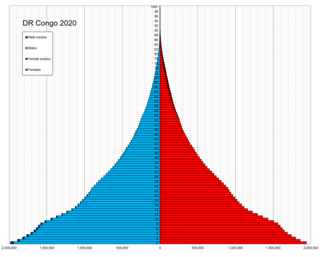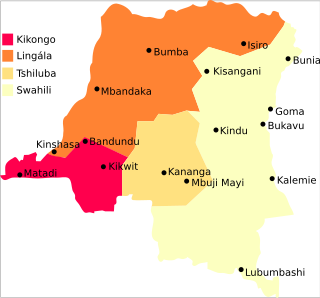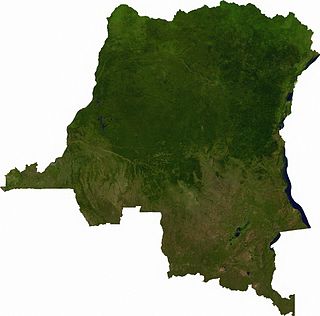Related Research Articles
The earliest known human settlements in what is now the Democratic Republic of the Congo have been dated back to the Middle Stone Age, approximately 90,000 years ago. The first real states, such as the Kongo, the Lunda, the Luba and Kuba, appeared south of the equatorial forest on the savannah from the 14th century onwards.

Demographic features of the population of the Democratic Republic of the Congo include ethnicity, education level, health, economic status, religious affiliations and other aspects of the population.

The economy of the Democratic Republic of the Congo has declined drastically around the 1980s, despite being home to vast potential in natural resources and mineral wealth; their gross domestic product is $69.474 billion as of 2023. During the last five reported years the exports of Democratic Republic of the Congo have changed by $15.2B from $13.3B in 2017 to $28.5B in 2022.

Politics of the Democratic Republic of Congo take place in the framework of a republic in transition from a civil war to a semi-presidential republic.
Telecommunications in the Democratic Republic of the Congo include radio, television, fixed and mobile telephones, and the Internet.

The Democratic Republic of the Congo (DRC), also known as the DR Congo, Congo-Kinshasa, Congo-Zaire, or simply either Congo or the Congo, is a country in Central Africa. By land area, the DRC is the second-largest country in Africa and the 11th-largest in the world. With a population of around 105 million, the Democratic Republic of the Congo is the most populous Francophone country in the world. The national capital and largest city is Kinshasa, which is also the economic center. The country is bordered by the Republic of the Congo, Central African Republic, South Sudan, Uganda, Rwanda, Burundi, Tanzania, Zambia, Angola, the Cabinda exclave of Angola, and the South Atlantic Ocean.

The national flag of the Democratic Republic of the Congo is a sky blue flag, adorned with a yellow star in the upper left canton and cut diagonally by a red stripe with a yellow fimbriation. It was adopted on 18 February 2006. A new constitution, ratified in December 2005 and which came into effect in February 2006, promoted a return to a flag similar to that flown between 1963 and 1971, with a change from a royal blue to sky blue background. Blue represents peace. Red stands for "the blood of the country's martyrs", yellow the country's wealth; and the star symbol the future for the country. It is one of the few national flags incorporating a diagonal line, with other examples including Tanzania, Namibia, Trinidad and Tobago, and Brunei.

The United Nations Organization Stabilization Mission in the Democratic Republic of the Congo or MONUSCO, an acronym based on its French name Mission de l'Organisation des Nations Unies pour la stabilisation en République démocratique du Congo, is a United Nations peacekeeping force in the Democratic Republic of the Congo (DRC) which was established by the United Nations Security Council in resolutions 1279 (1999) and 1291 (2000) to monitor the peace process of the Second Congo War, though much of its focus subsequently turned to the Ituri conflict, the Kivu conflict and the Dongo conflict. The mission was known as the United Nations Mission in the Democratic Republic of Congo or MONUC, an acronym of its French name Mission de l'Organisation des Nations Unies en République démocratique du Congo, until 2010.

Lesbian, gay, bisexual, and transgender (LGBT) people in the Democratic Republic of the Congo (DRC) face discrimination and legal challenges not experienced by non-LGBT residents. Same-sex sexual activity is legal for both males and females in the Democratic Republic of the Congo, although LGBT individuals may still be targeted for prosecution under public indecency provisions on occasion.

The following outline is provided as an overview of and topical guide to sports:

The Democratic Republic of the Congo is a multilingual country where an estimated total of 242 languages are spoken. Ethnologue lists 215 living languages. The official language, since the colonial period, is French, one of the languages of Belgium. Four other languages, three of them Bantu based, have the status of national language: Kikongo-Kituba, Lingala, Swahili and Tshiluba.

Rugby Africa is the administrative body for rugby union within the continent of Africa under the authority of World Rugby, which is the world governing body of rugby union. As of 2018, Rugby Africa has 37 member nations and runs several rugby tournaments for national teams, including the Africa Cup which is the main 15-a-side competition for African national teams.

Articles related to the Democratic Republic of the Congo include:

The East African Federation is a proposed federal sovereign state consisting of the eight member states of East African Community in the African Great Lakes region – Burundi, the Democratic Republic of the Congo, Kenya, Rwanda, South Sudan, Tanzania, Somalia and Uganda. The idea of this federation has existed since the early 1960s but has not yet come to fruition for several reasons. In September 2018, a committee was formed to begin the process of drafting a regional constitution, and a draft constitution for the confederation was set to be written by the end of 2021 with its implementation by 2023. However, the COVID-19 pandemic disrupted plans to draft and implement a constitution. On 9 May 2023, the drafting of the constitution resumed with a 20-day consultation with local stakeholders in Kenya.

The Brazzaville–Kinshasa Bridge is a proposed road-rail bridge construction project over the Congo River. It will connect the Republic of the Congo with the Democratic Republic of the Congo at their respective capitals, Brazzaville and Kinshasa. The project has proceeded intermittently, but work was slated to begin in 2023 and be completed in 2028.

Mass media in the Democratic Republic of the Congo are nationally and internationally state-owned and operated.
Rugby union in Benin is a minor but growing sport.
Rugby union is a minor but growing sport in the Republic of the Congo.
The 2014 Africa Cup was the fourteenth edition of the Africa Cup, an annual international rugby union tournament for African nations organised by the Confederation of African Rugby (CAR). The tournament, as well as the 2012 and 2013 editions of it, served as the qualifiers for the 2015 Rugby World Cup.

General elections were held in the Democratic Republic of the Congo on 30 December 2018, to determine a successor to President Joseph Kabila, as well as for the 500 seats of the National Assembly and the 715 elected seats of the 26 provincial assemblies. Félix Tshisekedi (UDPS) won with 38.6% of the vote, defeating another opposition candidate, Martin Fayulu, and Emmanuel Ramazani Shadary, backed by the ruling party PPRD. Fayulu alleged that the vote was rigged against him in a deal made by Tshisekedi and outgoing President Kabila, challenging the result in the DRC's Constitutional Court. Different election observers, including those from the country's Roman Catholic Church, also cast doubt on the official result. Nonetheless on 20 January the Court rejected his appeal and declared Tshisekedi as the winner. Parties supporting President Kabila won the majority of seats in the National Assembly. Félix Tshisekedi was sworn in as the 5th President of the Democratic Republic of the Congo on 24 January 2019, making it the first peaceful transition of power in the country since it became independent from Belgium in 1960.